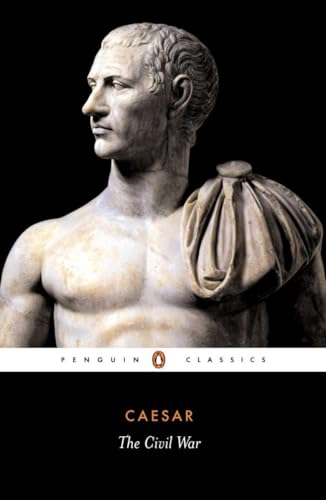The Civil War of Caesar (Penguin Classics)
Julius Caesar
BOOK REVIEW

In the annals of history, few figures loom as large as Julius Caesar, and his work, The Civil War of Caesar, is a gripping testament to the chaos and ambition that defined his era. This text isn't merely an account of military engagements; it's a riveting exploration of power, betrayal, and the very fabric of Roman society-an electrifying chronicle that drags readers into the heart of one of history's most tumultuous periods. 🌪
Picture a Roman landscape teetering on the brink of collapse, where loyalty is as fleeting as the Roman sun. Caesar's words cut through the noise, revealing not just the tactical maneuvers of his legions but the emotional currents that drove men to fight, betray, and aspire to greatness. The raw intensity of his narrative is not just an invitation to witness history but a command to feel it, to grip the edges of the page in desperation as the threads of fate entangle the characters of this epic saga. You won't just read about these events-you will live them.
As the civil discord unfolds, Caesar depicts the vividly stark battle lines drawn between him and his political adversaries. The stakes are monumental: the future of Rome hangs in the balance. Here, Caesar isn't just a general; he is the harbinger of a new political era, teetering between tyranny and democracy, savagery and civilization. You can almost hear the clang of swords and the anguished cries of gladiators as alliances form and dissolve with the turn of a single phrase-a testament to the fragile nature of power, where today's allies can become tomorrow's enemies without a moment's notice.
Critics are often divided on Caesar's portrayal of himself. Some perceive it as a self-serving embellishment, while others praise his raw honesty and strategic foresight. This polarizing narrative isn't simply historical; it's a reflection of the complexities of human nature-ambition, fear, loyalty, and betrayal. Some readers have expressed frustration at what they perceive as a lack of objectivity, arguing that Caesar's favorable self-portrayal casts shadows over his opponents. Yet, it is this very subjectivity that makes the work so visceral. It shakes us from our readerly complacency, forcing us to confront the ethical dilemmas that accompany leadership and conflict.
In The Civil War of Caesar, the echoes of ancient Rome resound in modern conflicts, compelling us to draw parallels with contemporary power struggles. The themes of civil war and internal strife resonate today, illuminating the human condition in ways that are neither antiquated nor stagnant. Your understanding of political dynamics, personal ambition, and the human psyche will be deeply enriched as you navigate the tumultuous waters of Caesar's narrative. The lessons are sharp, the implications vast-this is not merely a recounting of history. It's a door to a deeper comprehension of ourselves.
Moreover, the gravity of Caesar's insights has sparked the imaginations of countless leaders and thinkers throughout history. His influence stretches far beyond Rome, inspiring figures like Machiavelli and even modern-day strategists who grapple with the ceaseless dance of power. When you digest Caesar's text, you are not just absorbing history-you find yourself at the crossroads of philosophy and practical governance, questioning not only the decisions of historical figures but your own.
The emotional rollercoaster that The Civil War of Caesar provides is utterly intoxicating. You find yourself empathizing with the fervor of battle, the pangs of betrayal, and the soaring aspirations of conquest. The text is charged with the pulse of life itself-a visceral reminder that history isn't just written in the annals of time; it is etched into the very hearts of those who lived it. 💔
Readers have described this work as both enlightening and haunting, with opinions ranging from admiration for Caesar's rhetorical prowess to skepticism over his intentions. However, it is precisely this duality that elevates the text from a mere historical record to a dynamic conversation about leadership and ethics. Each page turned acts as a conduit connecting you to the past, igniting a fire of introspection about our collective future.
Dare to immerse yourself in The Civil War of Caesar and you might discover something unsettling-how easily the cycle of ambition, conflict, and compromise repeats throughout time. This is more than a book; it's a vibrant tapestry that threads through the ages, daring you to look deeper into your own motivations and the world around you. Don't just read it-experience it. The revelatory journey awaits.⚔️
📖 The Civil War of Caesar (Penguin Classics)
✍ by Julius Caesar
🧾 368 pages
1976
#civil #caesar #penguin #classics #julius #caesar #JuliusCaesar